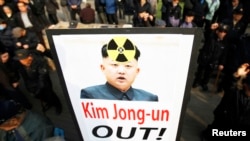SEOUL —
South Korea is issuing its sternest warning yet to North Korea not to conduct another nuclear test, which some officials in Seoul and Washington say may be imminent.
After South Korean President Lee Myung-bak convened a meeting of his top national security officials Thursday, his government warned North Korea it faces harsh punishment should it go ahead with a nuclear test.
In a statement, presidential spokesman Park Jeong-ha warned Pyongyang of “very grave consequences” unless it immediately halts “all provocative words and actions” and complies with international obligations.
That sentiment was echoed hours later by foreign ministry spokesman Cho Tai-young.
Cho confirms the government issued a “grave warning” at the meeting of foreign affairs and security ministers. The spokesman says Seoul insists Pyongyang “move towards de-nuclearization on the Korean peninsula, as they have promised” and Pyongyang “must bear in mind that only isolation is waiting” if it continues such provocations.
North Korea conducted nuclear tests in 2006 and 2009. It has also carried out long-range rocket launches that the international community has condemned as thinly disguised inter-continental ballistic missile tests.
For those actions, the United Nations Security Council has imposed sanctions on the reclusive and impoverished state.
Pyongyang recently warned it would continue with rocket launches and carry out a third nuclear test of a “higher level” that it contends will be aimed at its declared "arch enemy," the United States.
In Thursday's security meeting in Seoul, officials say President Lee instructed his defense minister to maintain strong military readiness in response to escalating tensions on the peninsula.
South Korean officials are not saying what sort of grave consequences the North could face or whether that could include military action.
Next month, South Korea takes the rotating presidency of the United Nations Security Council. That will allow it to convene meetings of the council at any time, something now considered a certainty should there be a North Korean nuclear test.
The two Koreas do not have a diplomatic relationship. They have technically remained in a state of war since a 1953 armistice brought to a pause three years of devastating civil conflict. The war also involved the Chinese on the North Korean side and the United States, backed by U.N. forces, on the South Korean side.
Military and intelligence officials in Seoul and Washington differ on assessments of North Korea's nuclear weapons development. The country is believed to have a few plutonium-fueled bombs and has revealed a facility it says is enriching uranium.
However, the general consensus is North Korea is still some years away from being able to make a warhead small and light enough to place atop an intercontinental ballistic missile.
After South Korean President Lee Myung-bak convened a meeting of his top national security officials Thursday, his government warned North Korea it faces harsh punishment should it go ahead with a nuclear test.
In a statement, presidential spokesman Park Jeong-ha warned Pyongyang of “very grave consequences” unless it immediately halts “all provocative words and actions” and complies with international obligations.
That sentiment was echoed hours later by foreign ministry spokesman Cho Tai-young.
Cho confirms the government issued a “grave warning” at the meeting of foreign affairs and security ministers. The spokesman says Seoul insists Pyongyang “move towards de-nuclearization on the Korean peninsula, as they have promised” and Pyongyang “must bear in mind that only isolation is waiting” if it continues such provocations.
North Korea conducted nuclear tests in 2006 and 2009. It has also carried out long-range rocket launches that the international community has condemned as thinly disguised inter-continental ballistic missile tests.
For those actions, the United Nations Security Council has imposed sanctions on the reclusive and impoverished state.
Pyongyang recently warned it would continue with rocket launches and carry out a third nuclear test of a “higher level” that it contends will be aimed at its declared "arch enemy," the United States.
In Thursday's security meeting in Seoul, officials say President Lee instructed his defense minister to maintain strong military readiness in response to escalating tensions on the peninsula.
South Korean officials are not saying what sort of grave consequences the North could face or whether that could include military action.
Next month, South Korea takes the rotating presidency of the United Nations Security Council. That will allow it to convene meetings of the council at any time, something now considered a certainty should there be a North Korean nuclear test.
The two Koreas do not have a diplomatic relationship. They have technically remained in a state of war since a 1953 armistice brought to a pause three years of devastating civil conflict. The war also involved the Chinese on the North Korean side and the United States, backed by U.N. forces, on the South Korean side.
Military and intelligence officials in Seoul and Washington differ on assessments of North Korea's nuclear weapons development. The country is believed to have a few plutonium-fueled bombs and has revealed a facility it says is enriching uranium.
However, the general consensus is North Korea is still some years away from being able to make a warhead small and light enough to place atop an intercontinental ballistic missile.





